Catching up with R&D Performance Products
Industry veterans have seen and done it all
If you look back at old personal watercraft magazines, you will find out that lot of companies that were producing aftermarket accessories and performance engine packages in the 1980s no longer exist.
Some of them reached their peak in the mid 1990s, though now that the sport is dealing with a downturn, only a few of those companies have been able to survive. R&D Performance Products USA of Santa Fe Springs, Calif. has seen it all and is the oldest aftermarket manufacturer in the industry.R&D’s strength, built over years of experience and know-how, made it the leading manufacturer of aftermarket performance products, as well as the company the PWC industry turns to when it needs answers and the best products available.
Over the years R&D has developed a complete line of two and four-stroke performance products and packages for Sea-Doo, Yamaha, Kawasaki, Honda, and Polaris. R&D is the only performance company in the watercraft industry that designs and manufactures all of its products in-house with state of the art software and CNC machines. Over the years this company has become the standard in the PWC field with unequaled quality, engineering and performance.
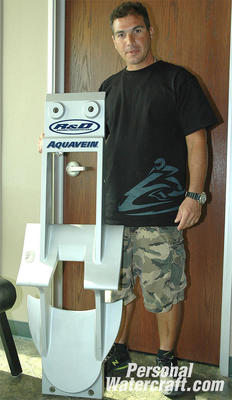 This enormous intake grate that was made for display purposes on a huge mold.
This enormous intake grate that was made for display purposes on a huge mold.The in-house production allows the company to produce the highest quality parts and accessories on the market. Additionally, R&D provides prototyping and custom air filter development/production services.
Entering the PWC scene
R&D started its involvement with the PWC scene back in 1982 when the first Jet Skis hit the market. Basically, the company designed and produced aftermarket parts in order to enhance the engine performance and hull characteristics. By the end of 1987, famous tuner Bill Chapin joined the R&D forces. Chapin focused on the research and development while Glenn Dickinson was (and still is) responsible for the manufacturing and marketing of the products.
According to Dickinson, the company’s most important aftermarket product was the R&D Aqua Vein intake grate. The design of the Aqua Vein series was unique from the early days of its production.
Four-stroke era
Four-stroke technology and the modern fuel injection system brought a great interest to the company.
Back in the early days, the tuner had to do a lot of work in order to boost the performance of a two-stroke engine. A highly-tuned Yamaha GPR needed race fuel and it could burn through it in absolutely no time. Nowadays you can easily tune the fuel delivery according to the air/fuel ratio and some other parameters, as well as by carefully programming a Powershot Unit. This enhances the performance substantially and still allows the customer to use pump gas. This is a very crucial parameter for performance and reliability for the customer.
R&D’s Bill Chapin
Bill Chapin, R&D’s research and development guru, has cooperated with riders and pioneers of the sport, including Christy Carslon, Victor Sheldon, Nicolas Rius, Jeff Jacobs and Chris MacClugage. Together they have won countless national and world championships in every classification of competition.
R&D has always been at the forefront of advancing two-stroke and four-stroke technologies and continues to bring customers and racers the highest quality, unmatched service, and unsurpassed value. R&D products are being distributed all over the world through the international distributors and dealerships.
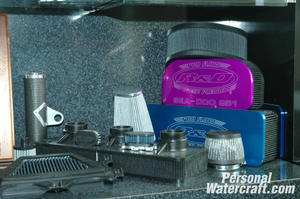 Some of the Power Plenums are still featured in Dickinson’s office.
Some of the Power Plenums are still featured in Dickinson’s office.I met Bill Chapin a few years ago at the World Finals and immediately realized his unique character and outstanding experience in every single field that has to deal with the performance of a personal watercraft.
Two years ago I was watching him develop MacClugage’s 15F Supercharged craft for a number of days. He did not even complain when I was taking spy shots of his everyday work, knowing of course that I was not planning to show his work to anyone else. MacClugage won the title in Pro Runabout class and managed to keep Team Kawasaki’s factory rider Dustin Farthing behind him.
Last year, Mike Klippenstein won the Pro Ski class on a Hydrospace S4 that was an arm pulling, accelerating ski with outstanding performance (I rode it the very next day). Chapin had given Klipper a hand for the engine tuning, as well as developing a better handling package for the S4. These are the latest examples that came to my mind about R&D’s remarkable performance and dedication to the sport. On the other hand, no one has forgotten the unique performance of Carlson and Rius or Sheldon between ‘92 and ’95.
My visit to R&D’s premises was arranged through Chapin when I was in Lake Havasu City, Ariz. during the World Finals. After completing the Kawasaki Ultra 250X with the R&D engine performance and handling kit, I asked Chapin whether it was possible to visit the factory. The sun had already disappeared behind the mountains when Chapin suggested that it was the right time to do it since the R&D factory had recently moved to its new facility in LA, near Orange County.
He immediately picked up his cell phone and called Glenn Dickinson. In the evening we went for dinner with Chapin and I found out that the company was involved in great innovations with the technology of personal watercraft, aftermarket goodies and tune up kits. The meeting was arranged for the very next day and we left Lake Havasu City and drove straight to northeast Los Angeles.
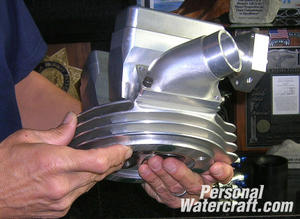 Dickinson shows us the billet cylinder head of a Jawa engine that was hand made by his father.
Dickinson shows us the billet cylinder head of a Jawa engine that was hand made by his father.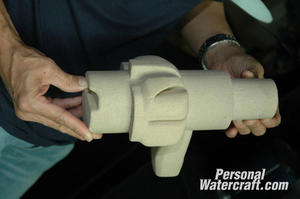 Dickinson holds an old R&D sand cast of a cylinder.
Dickinson holds an old R&D sand cast of a cylinder.Dickinson explained that everything started in the back yard of his house. Along with his father, they designed and fabricated special parts for personal watercraft and motorcycles. During those early years, both of them had to work hard every day in order to overcome the costs of research and development prior to manufacturing the parts, since the demand was not all that high in the beginning.
Over the years R&D managed to become one of the biggest aftermarket companies in the industry. The innovative designs, along with the high quality of the products and the unique performance that they offer, boosted the sales of R&D products in the US and all over the world. R&D is cooperating with Yamaha Motor Corp. USA and makes official Yamaha aftermarket accessories, such as power filters for motorcycles and ATVs.
Wooden molds, sand castings, power filters, exhaust silencers for motocross bikes and billet cylinder heads can be found crowding Dickinson’s office.
Making the molds or the tooling for particular products requires dedication and precise calculations in order to avoid mistakes that will bring disaster in the production line. Chapin told me that R&D takes a lot of things under consideration before deciding to make some special part or a performance package for a particular craft. That is why you don’t find a parts list for some models in the R&D catalogue.
He showed me R&D’s heavily modified SX-R Stealth intake grate that was made for Klipper’s S4 and informed me that he will not produce the required tooling unless he knows the Austrian company’s future. When someone like Chapin gives you such a note, you take it under serious consideration.
Apart from making engine performance parts and handling packages, R&D also designs and manufactures special tools that make the mechanic’s life easier. Also, the company makes parts that help to monitor engine performance and adjust the air to fuel ratio or other parameters in order to maintain high engine output.
Hanging around the R&D facility
One of the first things I noticed when stepping foot on the new R&D premises are front covers of magazines and pictures of famous riders.
The facility is much larger than I expected it to be. CNC machines were working away and technicians were drilling on precision drilling machines, lathes and milling machines.
Since the Kawasaki Ultra 250X was the hottest personal watercraft of the 2007 season, plenty of parts could be found around the factory just for this particular vehicle. The cast parts of the sponsons were ready for drilling and taping, while the carbon R&D ride plates were freshly made during that time and packing had already started.
Storing the goods
Walking around the storage department, you realize how short the history of the sport is simply by reading the codes of the accessories on the selves. Name any R&D accessory for an old personal watercraft and you will find it on these selves. Everything from cast aluminum drop nozzles for GPR’s to tricky ride plates and flame arresters for SX’s and Super Jet’s. Power filters, any sort of adaptors and God knows what else is stored on these selves.
This year the new IJSBA rules take the sport back to the good old days of the ‘Modified’ years. This allows the two-strokes to use special cylinders and crankshafts. Chapin had informed me that in the past R&D had manufactured cylinders with power valves so it would simply bring the technology back for the customers.
Although, these rules apply for everyone, only a small percentage of racers will spend the fortune necessary to build a high performance, stand-up racing machine. According to Chapin, these are not the actual customers of R&D. Nowadays the company builds performance kits for the popular runabouts. The recreational riders and weekend warriors make up the bulk of R&D’s customers all over the world.
R&D has nearly completed the engine performance and handling kits for the new Sea-Doo RXP-X and RXT-X and Chapin mentioned that these new crafts have a lot of potential to get better in terms of acceleration, top speed and handling. Also, he has already put his hand into the Yamaha’s new FX SHO and soon R&D will release the true power out of the big bore power plant.
Four-stroke technologies have taken the sport to a whole new level and R&D was there from the beginning, designing and producing special parts for the updated demands of the market.
Get PersonalWatercraft.com in your Inbox!
Like PersonalWatercraft.com on Facebook
Comments
Most Popular
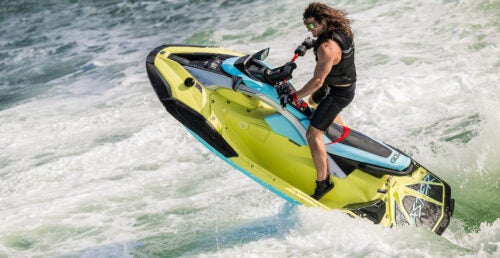
2025 Yamaha JetBlaster PRO 2-Up Review
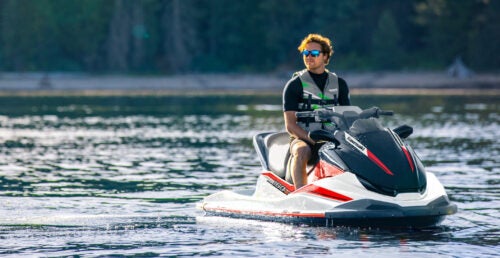
2024 Kawasaki Jet Ski STX 160X Review
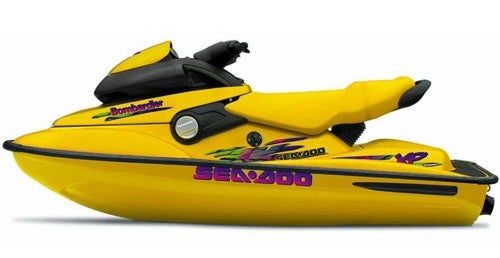
Remembering the Sea-Doo XP
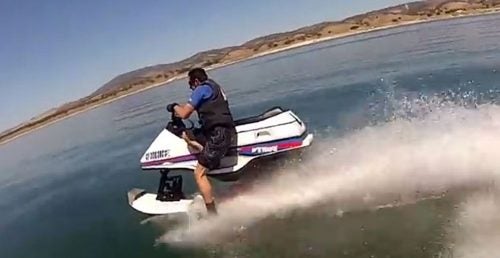
Whatever Happened to the Wetbike?
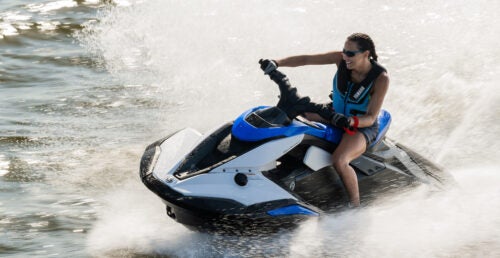
2025 Yamaha JetBlaster Review
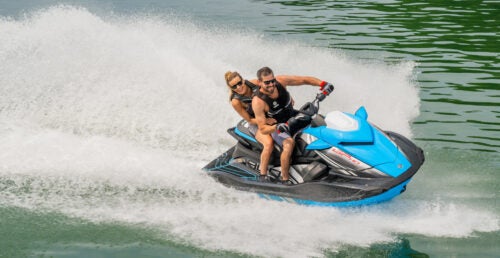
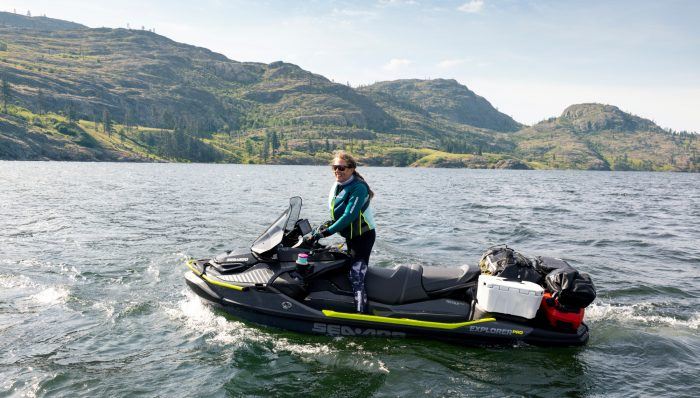
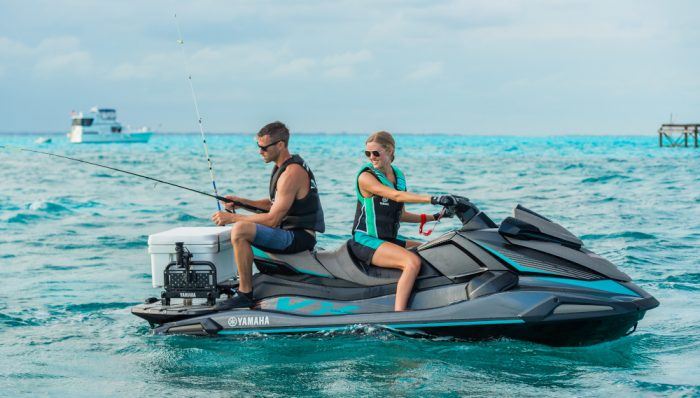
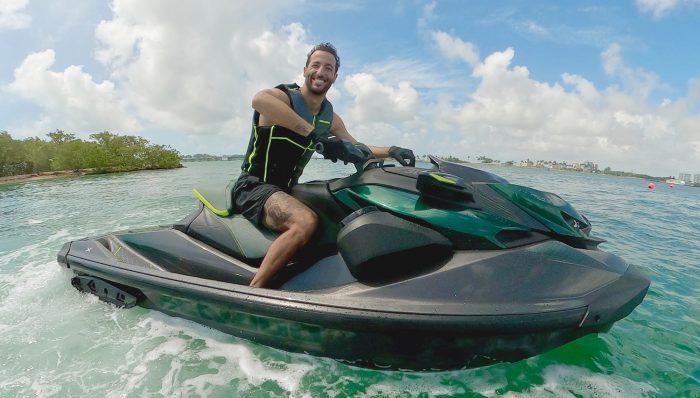



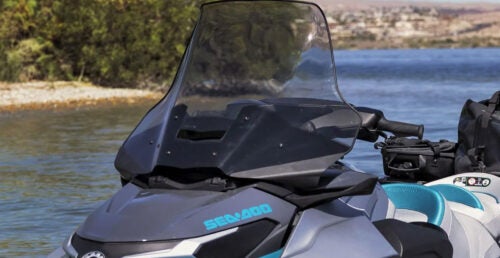
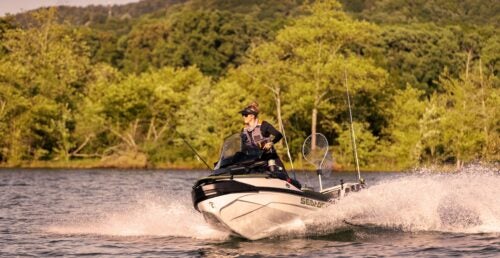


 Your Privacy Choices
Your Privacy Choices